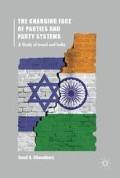Abstract
Political parties falling under the left ideological block held decisive influence in the parliamentary politics of both Israel and India. The two dominant parties of the block in the two nations have been the Israeli Labor Party and the Communist Party of India (Marxist). Despite dominating the parliamentary politics for a considerable period, the left in Israel and India witnessed considerable shrinkage in their seats and the voting percentage in recent times. While the Israeli Labor appears to be regaining electoral base by political understandings and alliance with like-minded parties on the one hand and changing its ideological orientation on the issues of security on the other, the Communists in India have been on the verge of extinction.
Access this chapter
Tax calculation will be finalised at checkout
Purchases are for personal use only
Notes
- 1.
The fight for the top leadership as general secretary in CPM took place between Prakash Karat and the West Bengal Chief Minister Buddhadeb Bhattacharya in 2005, leading to the former’s dominance of the party for ten years. However, the dismal failure of CPM in 2014 Lok Sabha elections bagging nine seats only, the lowest since its formation, led to the change of leadership in 2015, from Prakash Karat to Sitaram Yechury.
- 2.
Referring to the Hebrew acronym, which means ‘energy’, Meretz was formed out of the union of Mapam , CRM and Shinui in 1992. Meretz symbolized the will for unity.
- 3.
Still constructing left block, Meretz contested 2015 Knesset elections separately, whereas the Labor entered the electoral fray as Zionist Union with Ha’Tnuah.
References
Bidwai, P. (2015). The phoenix moment: Challenges confronting the Indian left. Delhi: Harper Collins.
Doron, G. (2002). Barak, one – One Israel, zero, or, how labor won the Prime Ministerial race and lost the Knesset elections. In A. Arian & M. Shamir (Eds.), The elections in Israel 1999. Albany: State University of New York Press.
Medding, P. Y. (1972). Mapai in Israel: Political organization and government in a new society. London: Cambridge University Press.
Peretz, D., & Doron, G. (Eds.). (1997). The government and politics of Israel. Colorado/Oxford: Westview Press.
Rodrigues, V. (2006). The communist parties in India. In P. R. deSouza & E. Sridharan (Eds.), India’s political parties. New Delhi: Sage.
Shapiro, Y. (198?). The party system and democracy in Israel. Tel Aviv: Tel Aviv University.
Westcott, K. (2002, November 20). Amram Mitzna: Labour’s ‘peace’ hope. BBC.
Author information
Authors and Affiliations
Rights and permissions
Copyright information
© 2018 The Author(s)
About this chapter
Cite this chapter
Choudhary, S.K. (2018). The Left-Wing Parties (Socialist Block). In: The Changing Face of Parties and Party Systems . Palgrave Macmillan, Singapore. https://doi.org/10.1007/978-981-10-5175-3_8
Download citation
DOI: https://doi.org/10.1007/978-981-10-5175-3_8
Published:
Publisher Name: Palgrave Macmillan, Singapore
Print ISBN: 978-981-10-5174-6
Online ISBN: 978-981-10-5175-3
eBook Packages: Political Science and International StudiesPolitical Science and International Studies (R0)

